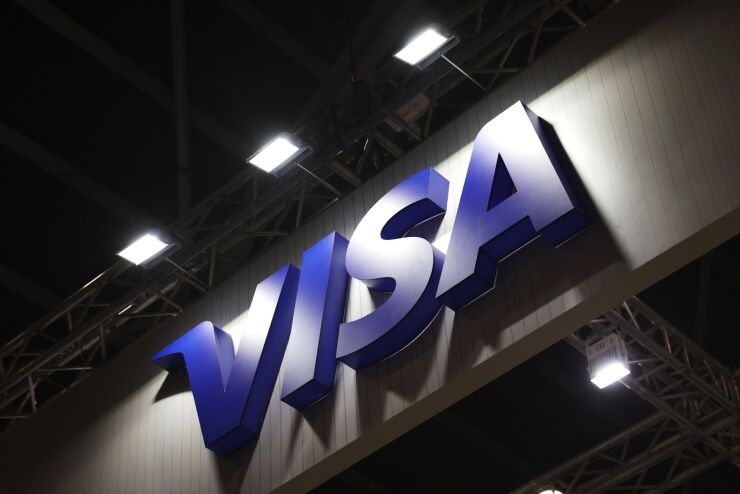
Visa's card-spending volume remained stable through the quarter that ended June 30, thanks to strong outbound U.S. travel activity, while European and Asian cross-border travel volumes are recovering more slowly.
But attention in the payments industry is shifting due to the recent launch of FedNow, the Federal Reserve's instant settlement system, and Visa is planning to stay ahead of the game with a service designed to block fraud in real-time payments.
Services built to streamline card acceptance and prevent fraud have an "enormous runway" for growth as merchants and banks cope with the rapidly evolving payments ecosystem, Visa CEO Ryan McInerney told analysts.
To that end, Visa is piloting a fraud-detection service based on deep-learning AI models called RTP Prevent, which generates a risk score for
The product offers a score from 1 (low trust) to 99 (high trust) with a code explaining the reasons for the score, and is designed to root out fraud within real-time payments as they expand around the world, McInerney explained.
"We've built it from the bottom up, [from a] clean sheet of paper, a customized solution leveraging deep-learning AI models [that can be] integrated directly into banks' systems," he said.
Visa's other value-added services, including CyberSource, Verifi and Visa Acceptance Cloud also are seeing strong adoption by new customers, while
A popular French peer-to-peer payments app called Lydia is now powered by Visa Direct, and in Bolivia, a new P2P app called Lula will ride on Visa Direct's rails, he said. Visa Direct plays a key role in many cross-border remittance services, he added.
Visa Direct transaction volume during the latest quarter rose 20% over the same period a year ago, to $1.8 billion, Visa said.
"It's still the very early days of building out Visa Direct. We're expanding geographies and use cases," McInerney said, noting that Block's Cash App relies on Visa Direct to move funds.
McInerney brushed off concerns about the recent
"The lawsuit itself is covered litigation under our share class structure. So I would really put it in the category of nothing new here," McInerney said.
He also said Visa has not felt any shocks from a Federal Reserve-ordered
"We continue to be very excited and confident about our ability to compete. We think that many merchants are going to choose to still route to Visa," McInerney said.
Visa Chief Financial Officer Visant Prabhu said economic trends look positive for at least the next quarter.
"Consumer spend across all spend bands from affluent to low spend remained stable. Our data did not indicate any behavior change across consumer segments," Prabhu said, but added that the average U.S. ticket size declined by 2%, which he attributed to lower fuel prices and easing of inflation in multiple categories.
During the recent quarter, Visa signed new co-branded card agreements with Utah-based Breeze Airways and with India-based airline Adani, which has 400 million customers.
During Visa's fiscal third quarter ended June 30, global payments volume rose 9% to $3.17 trillion. U.S. payments volume rose 6% during the quarter over the same period a year earlier and volume from outside the U.S. rose 12%.
Total cross-border volume was up 22% and total processed transactions during the quarter reached 54 billion, up 10% over the same period last year.
Operating expenses during the quarter were $3.1 billion, down 1% over a year earlier, as litigation costs fell and personnel costs increased.
Visa reported net revenue for the quarter of $8.1 billion, up 12% over $7.28 billion during the same period a year earlier. The firm's net income was $4.2 billion, up 22% from a year earlier. Minus adjustments from last year's legal expenses, Visa's profit was up 7%.
"We believe Visa's growth opportunities and competitive moat have widened," said Bob Napoli, a partner with equity firm William Blair, in a Friday note to investors. "B2B payments, fintech and other partnerships, global expansion, contactless payments, open banking, embedded payments and faster payments all present substantial opportunity, and many are in the early stages of adding to long-term growth."






